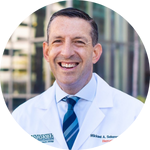
If you’re pursuing a medical career and find yourself drawn toward education and research, a career in academic medicine may be the right fit. For physicians, academic medicine means you spread your time between research, teaching, and caring for patients.
To get insight into this unique career path, we spoke with Dr. Mikkael Sekeres, Chief of the Division of Hematology, Sylvester Comprehensive Cancer Center at the University of Miami Miller School of Medicine.
Here’s what he shared about the rewards and challenges, what a day in the life looks like, and advice for those considering this path.
What is one major reward and one major challenge of a career in academic medicine?

Without a doubt, for a career in academic medicine, a major reward is having the opportunity to identify unanswered questions in what we understand about disease, how we treat disease, and how we can make our patients’ lives better — and to solve those questions. We can actually translate what motivated us to first go to medical school, that drive to help other people, into results. It’s a privilege.
A major challenge of a career in academic medicine is in overcoming the many hurdles thrown in your way on that path to discovery! These can include finding funding to support those great questions, putting into place operational structures to conduct the right research, and publishing the results that will inform future research and the practice of medicine.
What does a typical workday look like for you?
I love this question because I chose to enter academic medicine for the lack of “typical”! I joke that my time is divided evenly into 50% seeing patients, 50% administrative time, and 50% doing research. I see patients in clinic one day each week and round on hospitalized patients one month each year, so those days are structured. On my clinic day, I see approximately 20 patients and spend any moment of downtime trying to keep email neutral for the day! On hospital service, I round in the morning and try to squeeze in the rest of my academic life —which marches along at its usual pace — into the afternoon.
As a Division Chief, I do spend a lot of time in meetings with my admin team discussing clinic and hospital operations, even getting into the nitty-gritty of patient flow in exam rooms and how patients are scheduled. We discuss finance, research operations and enrollment, and residency and fellowship structure and education. And we spend a ton of time on recruitment of new faculty.
I also participate in research on non-patient days. I’m a clinical researcher, so my computer is my “benchtop.” I often work on a variety of projects at different stages of maturation, all at the same time, so one hour I might be writing or editing a clinical trial protocol, the next hour working on regulatory aspects of research that we’re starting, another hour reviewing data outputs of trial results, and another hour writing or editing manuscripts with results!
I usually start work a little after 8 a.m. and end around 6 p.m. Some days I start with a meeting at 7 a.m., and some days I get the kids off to school and start later. Other days I have meetings that end at 7 p.m., or in the afternoon and I make it to my kids’ sporting events. Academics allows for some of that flexibility!
What is your top piece of advice for someone looking to pursue a career in academic medicine?
To be successful, you have to see projects through to their completion. There are a lot of super smart people with clever research ideas. Only a percentage of them put those ideas to paper and organize a project to pursue those ideas. And only a percentage of those people complete the research and write a manuscript with the results from that research. You owe it to research funders, personnel, and most importantly to the patients who volunteered themselves to your research, to see your projects through to completion.
How can students use Figure 1 to help prepare for a career in academic medicine?
Most of my research ideas started with a question we asked in clinic or on rounds in the hospital. Figure 1 includes a wealth of patient cases that can spark research questions. Any time you find yourself wondering about the correct answer to a clinical question, or mechanism of disease, or risk factor for outcomes — that is an opportunity to design a research project.
Published August 1, 2022
Join the Conversation
Sign up for Figure 1 and be part of a global community of healthcare professionals gaining medical knowledge, securely sharing real patient cases, and improving outcomes.


